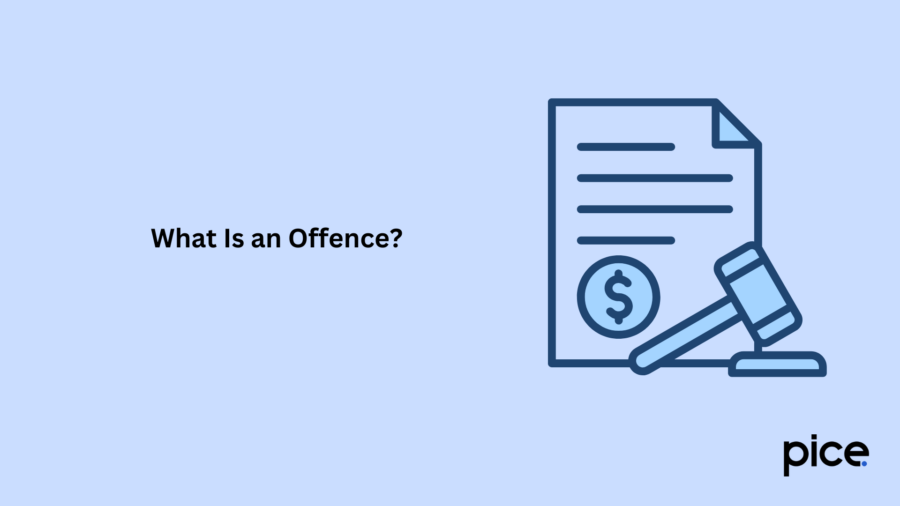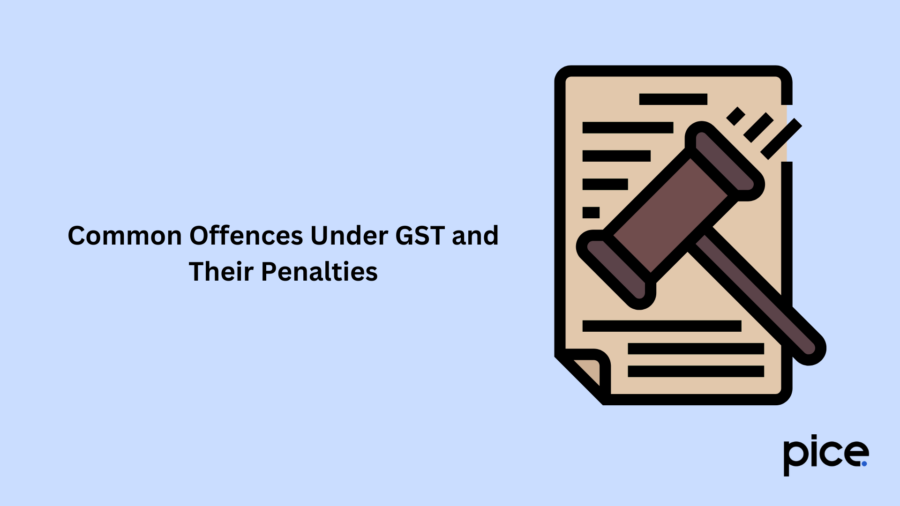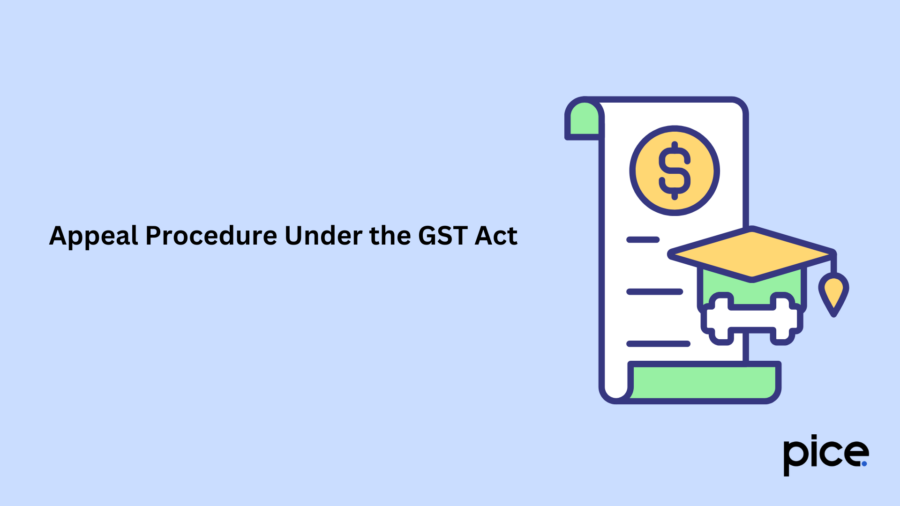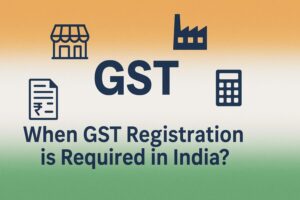Offences and Penalties Under GST
- 28 Jan 25
- 11 mins

Offences and Penalties Under GST
- What Is an Offence?
- What Are the Offences Under GST?
- What Does Penalty Mean?
- Common Offences Under GST and Their Penalties
- Situations Where There Is No Penalty (But Interest May Apply)
- What Are the Penalties Under GST?
- Minor Breaches Under GST
- General Rules Regarding Penalty
- Appeal Procedure Under the GST Act
- Conclusion
Key Takeaways
- GST offences like fraud or tax evasion can result in heavy fines and imprisonment.
- Minor errors below ₹5,000 may only attract warnings, while serious breaches face stricter penalties.
- Fraud penalties include 100% of the tax due or ₹10,000, whichever is higher.
- Businesses can appeal GST penalties through a multi-level process up to the Supreme Court.
- Staying compliant with GST laws helps avoid penalties and ensures smooth operations.
Businesses with a turnover of ₹40 lakh per annum must pay Goods and Services Tax in India. They should be aware of the offences and penalties under GST that can be imposed upon them in case their actions fall under a breach of law.
This blog will discuss some offences and their penalties, which can range from fines to imprisonment, depending on the offence. It will also go into some situations where there is no penalty but interest may apply, what the penalties are in fraud cases, and other important topics.
What Is an Offence?

An offence is when someone breaches a law or rule, which is punishable under the law. Fines can be imposed, and imprisonment is possible. Likewise, there are offences under GST, which are breaches of the provisions of the GST Act and rules.
What Are the Offences Under GST?
According to the GST Act, some different offences can attract penalties under the GST regime. These offences are:
A. GST Offences Associated with Invoices and Documentation
● If someone issues a false or incorrect invoice or does not issue an invoice for goods or services supplied
● Issuing GST invoices without an actual supply of goods or services
● If someone issues an invoice or document using the GSTIN of a different GST-registered person or entity
● Transporting taxable goods without proper/correct documentation is an offence under the GST law
● If a business fails to upkeep relevant documents/financial records per the requirements of the GST Act
B. GST Offences Linked with Fraudulent Intent
● Submitting false information while registering for GST
● When someone does not register under GST, although being required to do so under the GST Act
● Obtaining a GST refund by providing false information
● If someone alters documents or records or supplies false information to evade taxes
● Tampering with or trading goods that had been attached, confiscated or detained under the GST Act
● Intentionally supplying, storing or transporting goods liable to be confiscated per GST rules
C. GST Offences Relating to Tax Evasion
● Underreporting or concealing turnover, which leads to tax evasion
● Failing to pay tax within three months of the due date, even if the tax was collected in violation of the GST Act's provisions. Here, the person must deposit it to the authorities within 3 months.
● If someone fails to deduct tax, or they deduct less than the actual amount supposed to be deducted. It also applies if they do not pay the tax they owe to the government (tax liability under paragraph 2 of Section 52 of the GST Act).
● Taking or using an input tax credit (ITC) despite receiving or supplying goods or services.
D. GST Offences Linked to Obstruction
● If someone obstructs or stops an official from doing their duties under the GST Act
● Destroying or tampering with documents or material evidence
● Providing falsified documents or failing to give documents/information sought by a person working with authority under the GST Act
What Does Penalty Mean?
GST laws do not specify a penalty provision and use definitions from other judicial pronouncements and fundamentals of jurisprudence. When someone commits an offence with deliberate intentions or fails to do something that was their duty, a penalty can be imposed by law as punishment.
It can be corporal as well as pecuniary, civil, or criminal. Both corporal (jail) penalties and pecuniary (monetary) penalties can apply under GST.
Common Offences Under GST and Their Penalties

Here are the offences under GST and the penalties applicable:
| Category of Offence | Penalty Amount |
| Delay in filing GSTR | Per the GST Act, the late fee for delaying while filing GSTR is ₹100 daily. It means the taxpayer will have to pay ₹100 under CGST and ₹100 under SGST, a total of ₹200 per day. Here, the maximum amount is ₹5,000, and there are no late fees on IGST. |
| Engaging in fraud | Here, the penalty will be 100% of the tax due or ₹10,000, whichever is higher. |
| Assisting someone who conducts fraud | According to the GST law, the penalty can extend up to ₹25,000 |
| Choosing a composition scheme despite not being eligible | Here, the Demand and Recovery provisions of Sections 73 and 74 of the GST Act will apply.For fraud cases, the penalty will be 100% of the tax due or ₹10,000, whichever is higher, and for non-fraud cases, the penalty will be 10% of the tax due, or ₹10,000, whichever is higher. |
| Not issuing an invoice | In this case, the penalty will be 100% of the tax due, or ₹10,000, whichever is higher. |
| Makes an incorrect invoice | Here, a penalty of ₹25,000 will be imposed. |
Situations Where There Is No Penalty (But Interest May Apply)
Certain situations exempt you from penalties under GST, but interest charges might still apply. Here are some examples:
| Category of Offence | Action Taken |
| Penalty for someone who charges an incorrect type of GST (Ex: - IGST rather than CGST or SGST). | There will be no penalty here. Taxpayers must pay the proper GST and receive a refund for the incorrect type of GST paid before. |
| Imposing penalty for incorrectly filing GST return. | No penalty will be imposed, but an 18% interest will be charged on the deficit amount. |
| Penalty for delaying paying invoices. | The Input Tax Credit will be reversed if the invoices are not paid within 6 months. Other than that, no penalty is imposed here. |
What Are the Penalties Under GST?
If someone commits an offence, then a penalty will be charged under GST. The principles, which are the base of these penalties, are also specified in the law.
Penalty in Cases of Fraud
An offender, upon committing a fraud (such as issuing a fake invoice), must pay a penalty amount of tax evaded, short-deducted, etc. (i.e., 100% penalty, which is subject to a minimum of ₹10,000). In fraud cases, the penalty shall be 100%, a minimum of ₹10,000.
What Is the Penalty for Helping Someone to Commit Fraud Under GST?
If someone assists another person to commit fraud under GST, they too will have to pay a penalty along with the offender. This can include fake invoicing or charging the wrong GST rate for a transaction of goods or services. This penalty can extend up to ₹25,000. Here are some other scenarios where the offender and the person helping them will have to pay penalties:
- If someone gets or receives any type of goods or services knowing that it violates GST rules
- When someone does not appear before the tax authorities upon receiving a summon
- In case a business owner does not issue an invoice as per GST rules
- If someone fails to account for any invoice that appears in the accounting books
Are There Any Jail Punishments?
There are corporal punishments (jail) in case of high-value fraud cases. Here, monetary penalties apply along with these punishments. Some of these punishable high-value fraud cases are:
| Tax Amount | Jail Term Applicable | Fine |
| ₹100 lakh to ₹200 lakh | Jail term up to 1 year | Fines apply in these cases |
| ₹200 lakh to ₹500 lakh | Up to 3 years | |
| Above ₹500 lakh | Up to 5 years |
Penalty for Other Cases (No Intention of Fraud or Tax Evasion)
The offender who does not pay taxes or makes short payments will have to pay a penalty of 10% of the tax amount due, subject to a minimum of ₹10,000.
General Penalty
In case of offences that fall under GST, and for which there are no penalties mentioned specifically, the offender will have to pay a penalty that extends to ₹25,000.
Minor Breaches Under GST
Minor breaches are when the tax amount is lower than ₹5,000 or errors are easily corrected and committed without any fraudulent intent. There will be no major penalties for small breaches. The tax authority could issue a warning in such circumstances.
This consideration will help small and medium enterprises if they make mistakes, and being penalised for genuine errors will cause damage to them. If the amount of tax due exceeds ₹5,000, the scenario is considered a major breach under the GST Act. In this situation, heavy penalties and jail sentences could be imposed.
General Rules Regarding Penalty
These penalty standards apply to all laws, including tax legislation, contract law, and other laws:
- Every taxable person for whom the penalty is levied will be issued a show-cause notice first and given a reasonable opportunity to be heard.
- The tax authorities will explain the reason for the penalty and the type of the offence.
- If someone voluntarily comes up when they breach the law, the tax authority may reduce the applicable penalties.
Appeal Procedure Under the GST Act

If a GST-registered person/entity is dissatisfied with any GST penalty-related order/decision issued by a tax authority/official serving as an adjudicating authority under the GST Act, an appeals process has been established. The appeal process under the GST Act is the same regardless of the type of crime or the GST penalties (monetary or otherwise) that apply to the specific offence. These levels of appeal possible are as follows:
- First Appellate Authority
Someone seeking settlement against an order issued by the adjudicating authority may appeal to the first appellate authority which is the first court of appeals accessible by them.
- Appellate Tribunal
A quasi-judicial body called the GST appellate tribunal has been established to settle disputes and hear appeals against orders of the first appellate authority.
- Appealing to the High Court
Next, taxpayers can file an appeal to the appellate tribunal's decision in state high courts, a higher level of appeal structure.
- Appealing to the Supreme Court
The Supreme Court is the final court where taxpayers can challenge GST penalties or different tax orders. The Supreme Court's decision on any GST penalties, jail sentences, or fines is final under current GST laws.
Conclusion
This blog has discussed some common penalties according to their offences and has discussed other topics, such as the appeal procedure businesses can follow, among others. Businesses that violate any GST laws will be considered offences, and penalties under GST will be imposed on them. These violations can lead to fines, interest, or imprisonment, depending on the severity.
Here, minor errors may only attract interest, but serious offences like tax evasion, making a false invoice, charging someone with a wrong invoice, or fraud can result in heavy fines, a maximum penalty, and jail terms. This is why businesses should be aware of the business compliances and specific penalties for different offences and seek tax professionals to ensure compliance.
💡If you want to streamline your payment and make GST payments, consider using the PICE App. Explore the PICE App today and take your business to new heights.
 By
By 

















